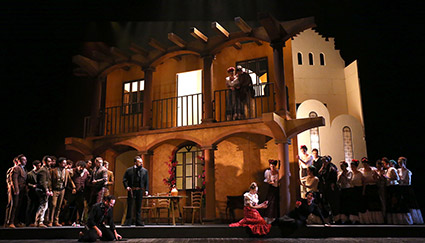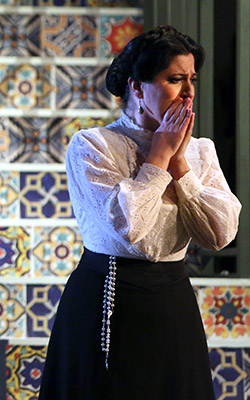
La malquerida
Music and libretto: Manuel Penella
based on the play by Jacinto Benavente
Teatros del Canal
(Madrid, 28 February 2017)
Reviewed by Antonio Díaz-Casanova
Rediscovering Penella the zarzuelero
It may be said of Manuel Penella, as of many other zarzuela composers, that we hardly know the smallest part of their work; especially as in his case tragic an opera (El gato montés, with its immortal pasodoble) has overshadowed his more amiable comedic facets, notably that exquisite pearl Don Gil de Alcalá. That is why this commendable initiative has been launched by Teatros del Canal (in co-production with Valencia’s Palau de les Arts), with the added incentive not only to discover a new work, but to explore Penella as the curiously lesser-known zarzuelero. How pleasing that the theatre and the project’s creators (Jorge Culla, Manuel Coves, Emilio López, Enrique Mejías García and Javier Carmena, among others) have taken the risk of setting up this work, instead of taken the easy route by mounting some other, better known title with an assured audience.
La malquerida (‘The Badly-loved Woman’, premiered in Barcelona in 1935) is an example of that ‘rural zarzuela’ (though in this case not ‘regional’, in Enrique Mejías’s subtle nuance) so fashionable in the 1920’s and 30’s. It brings to mind works with such strong plots and characters as La del Soto del Parral or La pícara molinera (there is a brief Penella melody that even recalls one of Luna’s in the latter work), where the sung element often reaches a climax with the most intense and heartbroken expression, sometimes close to a scream, that is so familiar – or used to be – from operatic verismo. On the other hand there are moments, perhaps the score’s most successful, where the atmosphere of zarzuela overflows with popular airs of easy melodic development – the serranilla, the jota, the comic dúo, the Sacristan’s coplas.

The most original and unexpected moment of the work deserves a more detailed mention: the blossoming of feeling between stepfather and stepdaughter, which defines the characters and their amorous situation. Just as everyone expects a duet between the soprano and the baritone, Penella provides what he calls ‘a song without words’, that is, a scene where the orchestra describes the situation as the two characters act mutely on stage. This is undoubtedly striking and surprising. Also noteworthy are the solos for three of the protagonists (soprano, tenor and baritone), in the case of the first two using original romanzas from the work (the tenor number most evocatively orchestrated), and in the case of the baritone by the addition of a romanza extracted from another Penella work, Curro Gallardo, with a broad orchestration and focused intensity of vocal expression.
 The production was capably cast, which in the case of the protagonists meant an arduous mission to speak much of the original play’s text, conserved by Penella for the zarzuela’s libretto. From this theatrical perspective the women succeeded better than the men – especially Cristina Faus, for the greater strength of her character on which the whole work turns; but also Sonia de Munck, who showed equal acting process. Vocally, Faus also came through with flying colours, dramatic and firm, especially thanks to her rhythmic clarity. De Munck did not have much music, but what little she had was sung efficiently. As for the men, Alejandro del Cerro (Norberto) revealed a beautiful and fresh voice, although the difficult tessitura of his romanza tested him hard. And César San Martín (Esteban) worked his socks off, for a difficult and complex character to get right. There were good performances from the comic couple of Sandra Ferrández and Gerardo López, and very convincing work from actress Elena Lombao in the role of Juliana.
The production was capably cast, which in the case of the protagonists meant an arduous mission to speak much of the original play’s text, conserved by Penella for the zarzuela’s libretto. From this theatrical perspective the women succeeded better than the men – especially Cristina Faus, for the greater strength of her character on which the whole work turns; but also Sonia de Munck, who showed equal acting process. Vocally, Faus also came through with flying colours, dramatic and firm, especially thanks to her rhythmic clarity. De Munck did not have much music, but what little she had was sung efficiently. As for the men, Alejandro del Cerro (Norberto) revealed a beautiful and fresh voice, although the difficult tessitura of his romanza tested him hard. And César San Martín (Esteban) worked his socks off, for a difficult and complex character to get right. There were good performances from the comic couple of Sandra Ferrández and Gerardo López, and very convincing work from actress Elena Lombao in the role of Juliana.
Manuel Coves conducted the Orquesta Sinfónica y Coro Verum, who played functionally, with a preponderance of fluid, clean musicality; above all helping the singers overcome the score’s difficult obstacles. The same can be said of Emilio López's stage direction, who moved the action to a Mexican hacienda, mariachi band and all. The geographical change (due, say to the team, to the original play’s popularity in that country) does not contribute anything, although it is equally true that it does not cause any worry. More importantly, the whole scenic apparatus ran smoothly, on a revolve presenting different aspects, both interior and exterior, of the hacienda.
In short, a collaborative work done with imagination, intelligence and above all enthusiasm, which allowed us to continue discovering forgotten examples of Spain’s lyric genre, in this case one by that multifaceted and very individual composer, Manuel Penella.
As for Benavente, that is another story ...
© Antonio Díaz-Casanova and zarzuela.net 2017
tr. © Christopher Webber
|
Cast: Cristina Faus (Raimunda); César San Martín (Esteban); Alejandro del Cerro (Norberto); Sonia de Munck (Acacia); Gerardo López (Rufino); Sandra Ferrández (Benita); Pedro Bachura (El Rubio); Elena Lombao (Juliana); Cristina Bernal (Milagros); Orquesta y Coro Verum; Mariachi Sol de América; Manuel Coves (conductor); Emilio López (director); Javier Carmena (chorus director); Nathalie Deana (designer); Gabriela Salaverri (costumes); Sergio Gracia (lighting) |
 |
![]() en español
en español
![]() Penella - biography
Penella - biography
![]() zarzuela.net, front page
zarzuela.net, front page
7/III/2017